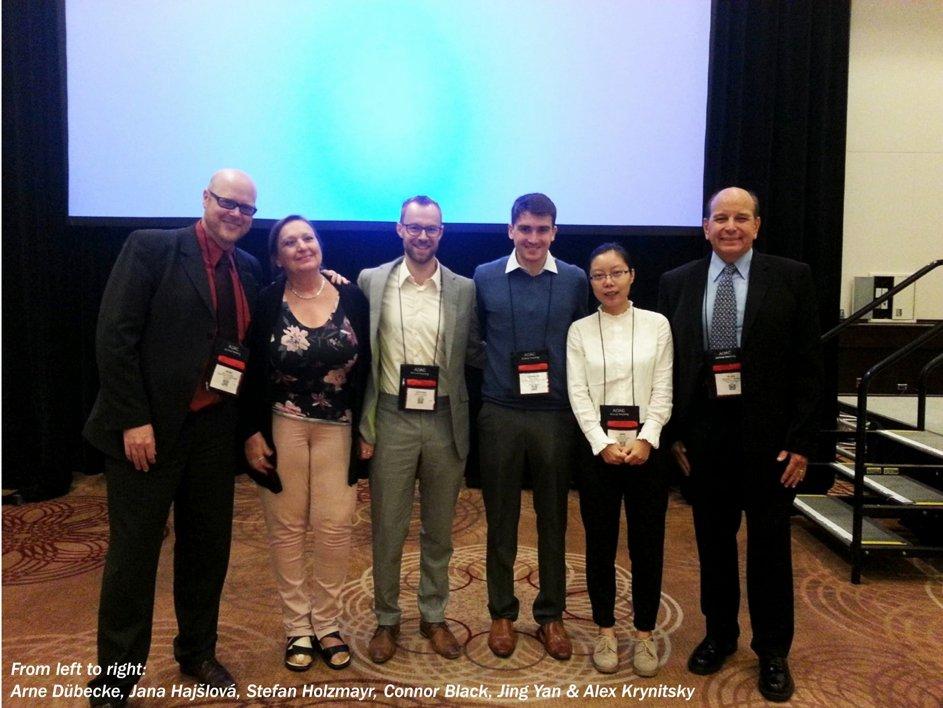- Arne Dübecke, head of the „Tentamus Center for Food Fraud (TCF2)“ and member „Quality Services International“, Bremen, Germany, and Alex Krynitsky of „Symbiotic Research“, New Jersey, USA, presented a session on the hot topic of food fraud. In that session, four international scientists were sharing their experience in the field with the audience.
- Connor Black of „The Institute for Global Food Security“ of Queen’s University Belfast, Northern Ireland, UK, started off reporting on his findings on using Rapid Evaporation Ionization Mass Spectrometry as quick detection method for adulteration of fish and meat.
- Jing Yan of „RIKILT Wageningen University & Research“, Wageningen, Netherlands, provided insight into the analytical determination of olive oil processing grades in the context of adulteration.
- Our Tentamus colleague Stefan Holzmayr of „aromaLAB“ in Munich, Germany, gave an account of how he can detect adulterated vanilline by analyzing carbon isotopes.
- Finally, Wiley Award Winner 2016, Jana Hajšlová of „UCT Prague“, Prague, Czech Republic, and chairwoman of the RAFA conference, concluded the series of presentations with a lecture on fingerprinting as an effective tool for authentication of products prepared from red and blue berries.
The session was very well reveived and discussions went on until the following session was about to commence. But that was not all from Tentamus!
As in the past few years, Alex Krynitsky also co-chaired the „New Blood“ session together with John Wong and Michael McLaughlin, both with FDA, were scientists new to a research field get a platform to present on their work. „At some stage my colleagues and myself noticed, that we always see the same faces talking at the podium. So we came up with the idea of a „New Blood“ session. We are very happy that this session is well accepted. It is a great pleasure each year to listen to the enthusiastic scientists who started up in a new topic and talk about their findings.“, Alex Krynitsky explains.
In this session the audience learnt about the analysis of PAHs (Diana Won), the toxicity of ozonation products of deoxynivalenol (Mengmeng Li) and a multi residues screening method for pesticides (Landon Wiest). Again, the Tentamus Group was represented in the form of Allyson Kingman of Symbiotic Research, New Jersey, USA, who reported on the identification of metabolites of agrochemicals.
„It was a very fruitful and stimulating conference for us. We were honored to have such great speakers in our sessions, especially as several of them had to travel for many thousand kilometers to get to Toronto. We sincerely thank all the speakers for their participation in the sessions and for their intriguing contributions and hope to see them again next time.“ Arne Dübecke concludes.
Tentamus Group GmbH was founded in 2011. Tentamus is a global product and safety group with a core presence in Europe, UK, Israel, China and the USA. Accredited and licensed Tentamus Group tests, audits and consults on all products involving the human body (food & feed, pharmaceuticals & medical, agrochemicals, cosmetics, agriculture & environment and nutraceutical & supplements). Tentamus Group is represented in over 50 locations worldwide. More than 2,500 highly-trained staff members work in over 1 million square feet of laboratory and office spaces. For further information please visit www.tentamus.com.
www.tentamus.com
Tentamus Group GmbH
An der Industriebahn 26
13088 Berlin
Telefon: +49 (30) 206038-230
Telefax: +49 (30) 206038-190
http://www.tentamus.com
Leiter
Telefon: +49 (421) 596 607 37
E-Mail: arne.duebecke@tentamus.com
![]()
